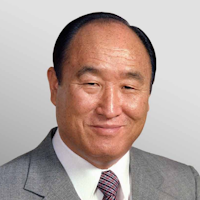Human beings live for ten months in the womb, a hundred years in this physical world and for eternity in the spirit world.
Sun Myung Moon

The Three Stages of Life
Topic: Life Beyond Death & the Spirit World
Human beings live for ten months in the womb, a hundred years in this physical world and for eternity in the spirit world... Death is similar to coming out of the womb, where we lived in a world of water, and in the process destroying the umbilical chord and the amniotic sac. Death is our second birth. It is our departure from this limited world, where we breathe through our nose, and our arrival in the place where we can receive God’s love. That is what death is. This is why we have a first ancestor and a second ancestor. Our path of life is such that we leave this world where we received our parent’s love and we seek out the place of the love of God, our infinite and eternal Parent. Embraced in God’s bosom, we form bonds of infinite life and love and return to the original homeland where we can live eternally. There we breathe love, just as we breathe air now. We originated from God, and by achieving this real authority of love we incarnate God. In love our value is equal.
Sun Myung Moon (born January 6, 1920, in Jeongju, in what is now North Korea – died September 3, 2012, in Gapyeong, South Korea) was a Korean religious leader, entrepreneur, and founder of the Unification movement. Raised in a rural Confucian-Christian household during the Japanese occupation of Korea, Moon’s early life was shaped by hardship, devotion, and a strong sense of spiritual calling. As a teenager, he experienced a profound vision in which he believed Jesus commissioned him to complete the work of restoring humanity to unity with God. This revelation became the foundation of his lifelong ministry, devoted to the ideal of universal peace and the healing of the relationship between the divine and human families.
In 1954, after enduring persecution and periods of imprisonment under both Japanese and communist authorities, Moon founded the Holy Spirit Association for the Unification of World Christianity in Seoul. His teachings—later presented systematically in the Exposition of the Divine Principle—offered a reinterpretation of Christian theology emphasizing God’s parental love, human responsibility, and the sanctity of marriage and family. Central to his vision was the belief that love is the creative force of the universe and that humanity’s purpose is to build a world reflecting the oneness of God’s heart. Through international missions, interfaith dialogue, and mass wedding ceremonies symbolizing global reconciliation, Moon sought to transcend divisions of race, religion, and nationality.
Beyond his religious work, Moon established numerous organizations in education, media, culture, and humanitarian service, aiming to foster dialogue, moral renewal, and peace. He and his wife, Hak Ja Han Moon, were regarded by followers as the “True Parents,” embodying the ideal of restored unity between men and women, heaven and earth. While his movement inspired both devoted commitment and significant controversy, Moon’s influence on global religion, culture, and peace initiatives remains substantial. His life reflected an unwavering pursuit of the vision of one human family under God—a vision he advanced with conviction, discipline, and enduring faith in the transformative power of divine love.
Cheon Seong Gyeong
Moon, Sun Myung, and Hak Ja Han Moon. Cheon Seong Gyeong. Seonghwa Chulpansa, 2015, pp. 677-681 [Book 7, Chapter 1, Section 1, The Three Stages of Life].

Sun Myung Moon
Theme: Life Beyond Death

About This Sun Myung Moon Quotation [Commentary]
Sun Myung Moon presents a clear and ordered view of human life: “Human beings live for ten months in the womb, a hundred years in this physical world and for eternity in the spirit world.” This three-stage path reveals life as a continuum, not interrupted by death but expanded by it. Death, he explains, is “similar to coming out of the womb,” a transition that requires us to let go of the old—just as the umbilical cord and amniotic sac are left behind at birth. Our physical life, limited and shaped by time, prepares us for what he calls our “second birth,” a movement from “this limited world” to a realm where we “receive God’s love.”
In this second stage, Moon says we “breathe through our nose,” relying on material elements like water, air, and light. But in the spirit world, “we breathe love, just as we breathe air now.” He describes this transition as our return to the origin, where we are “embraced in God’s bosom,” no longer separated by material needs or finite understanding. There, we “form bonds of infinite life and love” and enter “the original homeland where we can live eternally.” Death becomes the passage into a dimension not of despair but of fulfillment—where the spirit no longer depends on the physical and is nourished entirely by divine love.
This journey is not only personal but shared. “We originated from God,” Moon writes, and by attaining “this real authority of love,” we “incarnate God.” Love becomes the measure of our growth and the condition of our eternal belonging. Life on earth, with all its striving and impermanence, finds its meaning in this movement toward the eternal. For Moon, the value of each person is equal in love, and death is the gateway into that equality. It is the beginning of a life that no longer ends—a life with God as “our infinite and eternal Parent.”
The Law of the Universe
Additional Sun Myung Moon Quotes
Resources
Related Quotes
Copyright © 2017 – 2026 LuminaryQuotes.com About Us